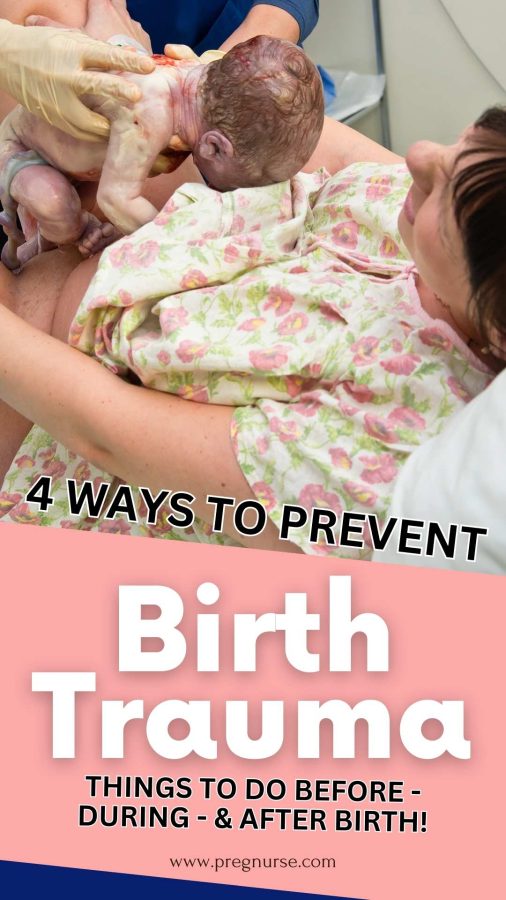Today I want to talk a bit about birth trauma and what you can do to try to prevent it happening in your case. I want to be really clear that not all birth trauma can be avoided. But, there are things you can do to be much more satisfied by your birth overall.

But, how do I know so much about birth trauma?
Hi — I’m Hilary — The Pregnancy Nurse 👩⚕️. I have been a nurse since 1997 and I have 20 years of labor and delivery nursing experience, I am also the curly head behind Pulling Curls and The Online Prenatal Class for Couples. 🩺 I have helped thousands of patients have their baby and I was very intentional about talking to them about their birth afterwards to see what we could process together, so let’s help you get prepared today!
And, as I said above, not all birth trauma can be prevented. I do, however, think these three things are a HUGE step in having issues surrounding your birth after you go home after having your baby. I also want to say that providers can cause birth trauma as well — so, hopefully we’re ALL working on creating better births! I just think it’s good to do everything you can from your side to have the best birth you can.
So, hopefully you’ll find these tips helpful.
I also discussed this in a recent podcast episode:
What is Birth Trauma?
Before we get going, we should talk about what birth trauma is.
Trauma is defined as: A deeply distressing or disturbing experience.
The thing is, that one thing that may be totally fine for one person, may be super traumatic for someone else.
A quick example I can think about is the IV. For some people it’s REALLY hard to have an IV placed. They have a lot of stress about it. But, for the majority of people (while it’s not fun) it’s something they can get through pretty easily.
So, birth trauma is a distressing or disturbing experience about your birth (or your care during pregnancy).
As a nurse we may have no idea that a person is being traumatized by an IV placement if they don’t say anything. If they say something we can work to make it better though. Hopefully that example helps you see it a bit clearer.
What Causes Birth Trauma?
You know, that’s where it’s hard. Things that aren’t traumatic (and possibly even are funny) for some people are deeply traumatic for others. I saw a woman on social media the other day talking about how horrible it was for someone to be screaming while having their baby down the hall from them.
Some patients giggle thinking it’s funny (and frankly, that may be a coping mechanism). Some are impressed by how powerful they sound and absolutely love it when it stops and we hear a baby.
And some people are left traumatized by that.
And we have to just accept how people feel about it and deal with that.
Honestly, the sky is the limit as far as what can cause trauma. Even when practitioners are trying to be helpful it can cause birth trauma when not dealt with in the right way.
That, of course, makes it really hard for the people working in the birth space as we try to navigate things as well as we can to make it the right experience for you.
Ok, so let’s prevent it!
Things That Can Prevent Birth Trauma
These three things certainly aren’t all the things, but I do think that they are the main drivers of birth trauma that can be prevented.
Clearly, medical things that happen that are outside of our control can be traumatic (example: an emergency cesarean because the baby’s cord falls out — called a prolapse cord), but these three things can even help in many of those situations.
Understand What Will Happen
Understanding what is likely going to happen as you go into the hospital is a great way to prevent a lot of birth trauma.
For the majority of pregnant patients, having a baby is one of the first hospital stays that they will have. They aren’t familiar with the hospital, how we do things and what to expect.
Taking a birth class that walks you through what to expect along the way is so important to prevent birth trauma.
For a long time birth classes really just focused on breathing and how to handle a “natural” birth — but I think we want to know more of what to expect in our lives now. People love being walked through what to expect.
Jess said this:
“I loved the specifics given in the class. I am a personality that needs to know what to expect before I experience it. This class helped tremendously…with step by step in what will happen at the hospital, and various procedures. Huge help!!”
An example can even be the admission process. The fact that you have to check in with a desk, they try to find a room, you may end up in triage behind a curtain, and then we ask 400 questions can feel traumatic for some people — especially if you’re in a lot of pain along the way.
But, if you know how that usually goes and that if the hospital is the best place for you that they will find you a room can help a lot. You expect those 400 questions and they’re not jarring when they ask you if your paternal side has any heart issues. Because yes — that’s a question.
A lot of the labor and delivery process is pretty routine. It has to be that way so that the staff can make sure to get all the important things done. If we were constantly doing everything different for every patient it would make a lot of room for errors to miss something important. So, we do it pretty-much the same.
And, it’s pretty easy to understand the routine if you learn from an expert. So I’d suggest you do.
Communicate With Your Healthcare Team & Provider
Communication is the root cause of a LOT of trauma, especially when something is deviating from the “norm” and we were prepared for it to happen a specific way (and not the way it is happening).
This communication starts at your prenatal visits. I would encourage you to find a doctor that you feel like you can talk to. If they don’t seem like they want to talk, or don’t talk in a way that works for you — find someone else. BUT do it soon. Often, around 30 weeks, it gets harder to switch providers. That doesn’t mean it can’t be done — it’s just harder. Tips for finding a provider you mesh with:
- Ask other moms who they used for recommendations (moms who seem similar to you are a good place to start)
- Call offices listed on your insurance to see how the staff seems (not always an indicator of how the provider will be)
- If you know of any nurses ask them — they may know a favorite or may have some friends they can ask.
But, this also means that you need to be upfront and honest about what questions you have and things you’re hoping for with your labor.
Sometimes people are traumatized by the IV because they weren’t planning on one, but never mentioned it to their provider. Then, they get to labor and delivery for an induction and realize that an IV is required to have an induction and they are upset. If they had told their provider all along they didn’t want an IV they could have had that discussion earlier and then made the right choice for them.
If there are specific things you’re hoping for in your birth tell your provider. Discuss it early on. Maybe its:
- Not having an IV
- Limiting cervical exams
- Eating during labor
- Having a doula in the room
You may want something that is VERY normal — like not having an episiotomy. But, then you and your provider can talk about why they might do one and what they can do to make sure you understand they will only do it if necessary (and they are sometimes — although rarely — necessary), and that they will get consent first. You’ll have an understanding of what will go on.
Once you head into the hospital, all of the practice communication you had during prenatal care will come into full force. The thing is, the hospital has ways we do things, but if you want something different you just have to tell us. Things like:
- Wanting to wear your own things in labor — fine with me!
- Temperature of the room
- Pillows for parts of your body
- Positions you’d like to be in
It is very normal to think that what we want is the norm — but in reality everyone is SO different, especially at a vulnerable time like labor. So, the more you tell us about what you want the more we can help give you that and help you have a great labor.
The bummer is that a lot of people are not great at communication. Especially in the healthcare setting.
The good news is that you really don’t need a special set of skills. Just learning to say what you need is a great start. Following-up those needs with gratitude when the need is responded to shows the staff that you appreciate what they’ve done for you, and it builds a relationship of trust between you two.
If you’re worried about communication during labor I have a whole bonus video in here that talks about how to communicate with your providers that I think you’ll really enjoy. Honestly, sometimes I just need to watch someone else start the communication to understand how to do it myself.
Pro Tip: Sometimes people find informed consent traumatizing because it will often include you or baby dying as a risk. Remember that if you car gave informed consent every time you got in would also say that. It is always a risk! Understanding how medical communication works is an important part of feeling empowered instead of traumatized.

Lower Expectations
I see a LOT of people online saying they were traumatized by a birth that didn’t happen the way they had envisioned.
First off, I am the WORST at this. I often have high expectations for a LOT of my life, and I find that it has only created heartache for me time and time again…. Hopes and dreams are one thing, but staying flexible in the moment has been a lesson I have learned the hard way.
This isn’t to say that you don’t have a birth plan . This means that you’re willing to take the birth that you have for what it is. And that you lower the expectations of your birth. You can grab my template here:
Process It Afterwards
So, you’ve had your birth, and something is bugging you about it.
Talk to someone about it.
Talk with your labor nurse if you’re still in labor and delivery, talk with your postpartum nurse about it. Talk with your provider about it when they come to visit you. Ask all the questions you have in your mind. If that particular provider doesn’t know, they can ask someone else. It may even be possible to see or call your actual labor nurse who can explain how things happened.
You may have something that bugs you that is very easily explainable and if you get that information then you can feel more comfortable moving forward.
The longer you wait the bigger the issue may become. Also, providers will become more “foggy” on what happened and be able to explain it to you.
So, ask questions. Providers really do welcome questions, and we can’t know what’s in your brain so just ask! You may feel silly, but don’t!
So, those are my three tips towards preventing birth trauma. It’s not going to prevent everything, but I think it’s a great start. Hopefully you have great providers who are doing everything they can on their end to prevent it on their side too. 🙂
Come join me in The Online Prenatal Class for Couples where in just a few hours we can get you prepared for your birth.
I love what Caitie P said:
“I really liked doing this class with my partner because we could do it from our couch and we learned a lot from Hilary. The class gave a lot of information, but wasn’t overwhelming and made me more comfortable going into delivery.”
Read more Online Prenatal Class for Couples Reviews Here
And, if you’re not quite sure you’re ready for that whole thing, check out my free prenatal class. It’s your first step toward getting in the driver’s seat of your birth.




 11 Easy Ways to Prepare for your Labor Induction
11 Easy Ways to Prepare for your Labor Induction
